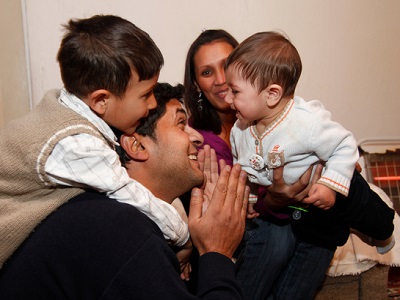Cover image: © UNICEF/UN038329/McConnico
Findings of research in neuroscience and parenting, provide evidence on the lifelong benefits of investing in the earliest years. At the same time, research findings have demonstrated that home visiting programs can increase parental well-being and parenting efficacy and child outcomes.
The courses contained in the resources for home visitors were designed to upgrade and enhance the role of home visitors and provide them with essential knowledge and tools to support and engage young children's families. Well-trained, respectful, sensitive and family centred home visitors can build on this motivation and contribute to strengthening parenting competencies family resilience and children well-being.
The modules were prepared through a consultative process involving international and regional experts, national trainers and home visiting professionals. Because cultural values and beliefs mediate parenting, these generic courses can be adapted to specific country contexts and enriched with local examples and tools.
The courses encourage home visitors to take a strengths-based approach, to promote robust caregiver-child relationships and contribute to reducing risk by supporting and referring families to other services as needed. We trust that training based on these courses will enable home visitors to develop positive, respectful and sensitive relationships with families; help them to assess regularly the strengths and needs of individual children and their caregivers; and assist them in supporting and empowering parents for informed actions and decisions concerning their young children’s health, well-being and development.
Learning objectives
By the end of this module, you will be able to:
- Describe some common parenting concerns and how they are related to the child’s stage of development.
- Perceive parents as partners with whom you collaborate in the best interest of the child and family.
- Support fathers and mothers in helping young children learn to self-regulate their emotions and behaviours.
- Share information and approaches with parents to help them deal with common parenting concerns, such as sleep/rest, calming, and toilet training in developmentally appropriate and realistic ways.
- Provide mothers and fathers with information to manage their young children's behaviours and promote optimal social-emotional development by encouraging positive behaviours and moderating negative behaviours.
Methodology
This course is composed of seven sections, including various examples, activities and assessments. This e-learning activity can be taken as a stand-alone course or, as part of the Home Visitors resources modules for Home Visitors and Care-takers.
Audience
- This course is intended for home visitors and home nurses to learn important information about the concerns that most parents of newborns and young children can face.
- This course is also open to parents, caregivers and UNICEF staff and UNICEF partners.
Length
It will take you about 1.5 hours to complete this self-paced course.
Structure
This course is composed of seven sections:
- Introduction
- Common concerns with infants
- Common concerns with toddlers/pre-schoolers
- Managing behaviours
- Positive discipline
- Summary
- Annexes
Contact details
For content queries, questions and suggestions, please contact Silvia Sanchez (sasanchez@unicef.org) or Aleksandra Jovic (ajovic@unicef.org).
For technical issues, please contact the Agora team (agora@unicef.org)
